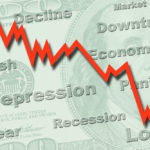Special to the Financial Independence Hub
A month ago, a relatively small number of people had heard about the CoronaVirus (since re-named COVID-19) and few people cared about it. In the past couple of weeks, the spread of the virus – and the damage it has done and is likely to do in terms of:
- Public health;
- Faith in institutions;
- Faith in political leaders, and of course;
- Faith in capital markets
– is already enormous. Many people think the trouble is only just starting. I’d like to propose a potentially mind-blowing scenario: what if the stock market declines we have seen lately are merely a variation on the theme of what a virus can do? If you’ve ever read Malcolm Gladwell’s The Tipping Point, you’ll know that some ideas spread a bit like viruses. Why not the “idea” of a market decline?
Robert Shiller is a Nobel prize winner and a professor at Yale University in New Haven, Connecticut. He has written and/or co-written several influential books about finance. One of those books, Irrational Exuberance, posits that many markets (localized real estate markets, for instance) can be influenced by the feedback loop of human behaviour. In other words, some people do certain things in response to others doing certain things. As an example, panic selling might beget more panic selling.
There are lots of people who would have us believe that this is simply not the case and that markets are highly efficient. Shiller provides ample evidence that a virus like response is very much analogous to what markets are doing. Just as a disease can be identified, monitored, presumably contained …. and then pow! We have a major pandemic on our hands, so, too, can capital markets languish for a bit and then drop precipitously.
I’m no expert on diseases, but I’m fascinated by various aspects of behavioural economics and I find both Shiller’s evidence and his reasoning to be sound. In practical terms, that means markets are likely to keep on dropping as long as people are fearful that they’ll keep on dropping.
Some people will want to get out (grab their supplies, get into quarantine) before the “big one” (a drop of 20%, 30%, 40% or more) occurs. To be clear, however, this is not about what I think personally. It’s about what your hairdresser, lawyer, real estate agent, school superintendent, insurance representative, health care provider and dozens of others think as a matter of general gut feel consensus.
Greater fool theory suggests that it may be shrewd to buy high and sell higher. It works in reverse, too. Sell now before the bottom falls out.
 John De Goey, CIM, CFP, FP Canada™ Fellow, is a Portfolio Manager with Toronto-based Wellington-Altus Private Wealth Inc. This blog originally appeared on the firm’s “Newswire” site on March 2, 2020 and is republished on the Hub with permission.
John De Goey, CIM, CFP, FP Canada™ Fellow, is a Portfolio Manager with Toronto-based Wellington-Altus Private Wealth Inc. This blog originally appeared on the firm’s “Newswire” site on March 2, 2020 and is republished on the Hub with permission.


